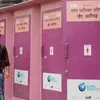One ex-corporate honcho's twin mission: mentoring rural entrepreneurs and creating future leaders through upskilling
Manav Subodh, Co-founder of 1M1B, is helping individuals in rural India realise their entrepreneurial dream with his recently launched initiative, Business Raja. For four years now, he has been training and preparing the next generation of impactful leaders.
In the rich urban culture, it is easy to not picture the rural areas devoid of development. Manav Subodh, noticed this very trend during his 10 years of working at Intel. Even as the global manager of Intel, he felt that something was amiss.
While handling marketing, startups, entrepreneurship, and corporate affairs of over 30 countries at Intel, Manav realised that rural India and its vast population was never part of his work. Manav discussed the possibility of shifting focus towards these areas in and outside his Intel network but soon learnt that the corporate world had different views from his. Developmental issues were seen fit only as part of Corporate Social Responsibility (CSR) projects.
“It is not strategic and important for the corporates but seen as something to be done over the weekend and leisure time,” Manav notes.
So, after completing 10 years at Intel, Manav quit his secure corporate life in January, 2015, and set out to do it himself. A few months later, he set up his non-profit organisation 1 Million for 1 Billion (1M1B), aimed at empowering a million youth who would then impact a billion people.

Manav Subodh, Co-founder of 1M1B
Say hello to Business Raja
Focussed largely on driving entrepreneurship in rural areas, Manav’s most recent initiative, Business Raja, was launched on Independence Day this year. An artificial intelligence (AI) enabled platform, it is guiding aspiring entrepreneurs in rural India to grow their nascent ideas, raising funds, and run their businesses successfully.
It is fairly simple in design. For the user, it is just another contact on WhatsApp they talk to about their ideas in three languages - Telugu, Hindi, and Kannada - as of now. Business Raja asks an user about their ideas, how they came up with it, measures the person’s personality, and attains a complete profile. It will also asses their responses to tough questions - a psychometric test of sorts.
“Business Raja is nothing but a big brother who will advise and take you through the different steps because many people don’t know how to start a business,” Manav told SocialStory.
An aspiring entrepreneur needs to follow a three-step process: first, share a business idea. Business Raja will provide reference resources that need to be completed. Then, the candidate will have to design a financial plan such as product pricing. Finally, if the idea works well, Business Raja will help in raising funds.
A final score of investment readiness will be sent to banks and the National Development Finance Corporation (NDFC) to get funding. At present, Manav is in talks in several banks and the organisation is looking for matching investors to support 40 entrepreneurs who have completed all the levels.
The first entrepreneur
To begin with, 1M1B put aside a small amount as the Business Raja Fund. Since this August, close to 5,000 entrepreneurs have approached the initiative, keen to start a business in their villages.
“We want to make sure that people in the rural area can start businesses and need not migrate to big cities, looking for opportunities, says Manav.

In fact, 1M1B recently funded its first entrepreneur - Merugu Aditya (30) from Krishna district, Andhra Pradesh. Manav shared that Aditya had to leave his job in Hyderabad and take care of his ailing mother.
Feeling stuck in his village with few opportunities, he approached Business Raja with an idea to set up a cybercafé there, which would also become a social hub. Aditya thought people could also meet up there and have snacks when they come to print or copy documents online.
He needed Rs 2 lakh to execute his plans and received Rs 50,000 from 1M1B, which, Manav says, has gone a long way. The money helped Aditya convince his family and community that he was doing something useful and they pooled in the remaining amount. Aditya has also purchased a Xerox machine and business is doing well.
The people behind Business Raja
Based in Bengaluru, he has a team of around 10 people, working across three teams - for video content, for the technology platform, and content matter experts who know how to set up a business find access and register it.
People who are well-versed in respective regional languages answer queries. After examining the data of different questions, the tech team developed and launched a chatbot for the first level of idea submission just 15 days ago. At present, people are still responding to queries at the next two levels.
Before launching Business Raja, the 1M1B team went to several villages to interview successful businesses. Those interviews, stored as videos, are now used to motivate aspiring entrepreneurs.
A desi MBA
Over the years, 1M1B had been organising skill development programmes. Manav calls them a three-month "desi MBA". These are aimed to make school dropouts and unemployed graduates job-ready.
In Narsapur, a small town in Andhra Pradesh, surrounded by around 23 villages, people are trained in five core skills - problem solving, collaboration, communication, empathy, and cognitive flexibility. These, Manav says, are skills of the future as deemed by organisations like World Economic Forum, World Bank, and the Fourth Industrial Revolution, among others. And 80 percent of the trainees gets placed in nearby towns, with few working at Reliance Fresh and Flipkart.
Preparing young leaders for change
The four-year-old, impact-focussed organisation has secured several prestigious marks. It is affiliated with the United Nations, and accredited to the UN Department of Global Communication, and the UN Economic and Social Council.

A team of 51 future leaders at United Nations on February 1, 2019
Every year, 1M1B Activate Impact Summit selects students from 105 schools across India and showcase their work at the UN headquarters in New York. These candidates are required to go through a 35-hour-long curriculum, including identifying their areas of passion like gender equality, climate change, among others.
While the basic criterion is to have helped 10 people, Manav shared that many have gone on to impact hundreds.
Prakruthi Raghvendra (16) from National Academy for Learning, Bengaluru prepared a course on body safety in Kannada and taught young girls living in the slum areas of the city.
Having presented her work at UN in February 2019, she says, “My goal is to create resource material on body safety and sexual abuse prevention in every vernacular language so that every girl, irrespective of their background, develops a voice to speak up.”
On December 4 this year, the fifth batch of students will present their work. Remarkably, these students, not older than 17 years, are advancing United Nations Sustainable Goals.
Despite these milestones, Manav says the journey has just begun. He signs off by saying that there is a long way to and he is just trying to make a mark.
(Edited by Saheli Sen Gupta)











